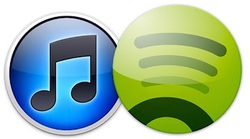
Adding to my idea that streaming music is the equivalent of setting ten dollar bills on fire is the fact that it's the younger generation who is most attracted to this format. Isn't this the generation that not only doesn't save money but is actually accumulating debt? I thought the whole iTunes vs Spotify debate was just the latest chipping away at the delayed gratification ethos that makes society work.
But how much money are we really talking about? Could the instant access to millions of songs justify the amount of money you are losing? Do you really "own" a digital song anyway?
- Kid graduates from high school and signs up for streaming service.
- Service is $10 per month but goes up $5 every ten years.
- Average inflation rate of 2% per year.
- Service is used for the next 40 years.
If I gave you $8,200 and told you you to spend every penny of it on music how many songs would you have? I guess it would depend on whether you bought whole albums or individual songs. But the point is, this is what you are giving up by streaming. This is the question that every consumer needs to answer. For the amount you pay each month you could build up a personal music collection worth over $8,200 in today’s dollars. It may not necessarily be a bad bargain. If you are the type of person who listens to hundreds of songs a month, you may think you are getting way more for your dollar by streaming than you could ever get from owning your music. Kind of like going to a buffet and eating ten plates of food for $13.99.
But we also need to consider the benefit of ownership vs renting. If you buy your music, you can play it at anytime without any monthly payments to make. It’s yours to keep. With streaming on the other hand, If you fail to make your streaming payment, you are cast out of the auditory Garden of Eden. But it’s still a bit more complicated than that.
The Greatest Generation would probably chastise their kids if they ever considered renting a house long term vs owning. Why? Because of equity. At any point you could sell the property and collect your share of the proceeds. This is where Apple throws us the curveball and comparisons to the material world go awry. Do you really own a digital song? It could be argued that if you can't resell something, you don't really own it. It would be great if you could spend a thousand dollars on music from iTunes and then at some point, put it up for auction on eBay. Let the highest bidder pay you for the music and you’d both win. You could reclaim some residual value for your songs and he would get a lot of music at a lower rate than if he purchased it from iTunes directly. But that's not possible today and may never be. So Apple has rendered what could have been the most compelling argument in favor of iTunes, moot. When various automotive publications look at the “total cost of ownership” of a vehicle they take into account re-sale value. The higher the re-sale value, the lower your cost of ownership. That’s how a brand that rarely discounts their merchandise like Honda can come out ahead of Chevrolet on the cost of ownership. When you “purchase” music from iTunes, however, your re-sale value is essentially $0.
So how would a corporation answer this question? They would look at how many songs they need to purchase and compare it to the present value of streaming. For instance, if they needed to buy $20,000 of music, it would make more sense to stream. If they only needed to buy $4,000 of music they would purchase the music outright and not even consider streaming. It’s no different than buying or leasing a car.
By this logic, it would make more sense for me personally to not stream but to purchase my music. Because I don’t listen to music enough to justify the relatively high monthly rate. I’ll never recoup the money in streaming if I look at it like a financial analyst. But you can't look at streaming music like you do a lease vs buy scenario. Can you? It's almost more an entertainment item like a cable subscription. So by doing the math I've confirmed that streaming music makes absolutely no financial sense. But hey, neither does paying five dollars for a cup of coffee or ten dollars to watch a two hour movie...once.



 RSS Feed
RSS Feed